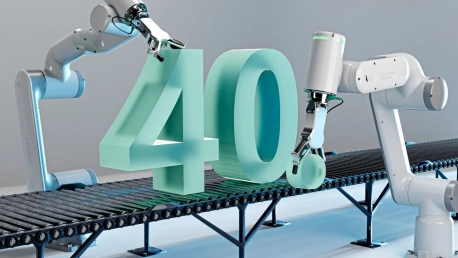Digital manufacturing is heralding a significant shift in industrial production, marking an era where data analytics and computational power converge to optimize manufacturing processes. As part of the sweeping changes associated with Industry 4.0, digital manufacturing offers a visionary approach, revolutionizing how products are designed, produced, and improved upon. Its influence stretches across every facet of the production lifecycle, from initial concept to customer feedback integration, thereby aligning with the broader trend of artificial intelligence and the evolving demands of global markets.
Revolutionizing Manufacturing through Data Integration
The Essence of Digital Manufacturing
At the heart of digital manufacturing lies a strategy that empowers machines to wield extensive data from different production stages for smarter communication and real-time adaptive action. Introducing “per-part intelligence,” this exchange of information is no longer solely the realm of production machinery but also encompasses the minutiae of design and the expectations of consumers. The ultimate aim is a manufacturing process that transitions from inflexible production specifications to one that is dynamic, comprehensive, and highly responsive to the actual needs of the end product.
Beyond Rigid Production: Adapting to Real-Time Demands
The versatility of digital manufacturing shines through its capacity to fold machine communication into product design and consumer demand. By embodying greater fluidity and responsiveness, the production process becomes not just about the creation of goods but about the creation of value that resonates with real-world use. This means that products are not only fashioned with precision but are also tailored to evolve with customer preferences, guiding industry practices towards a future where responsiveness is ingrained in the DNA of production.
Impact of Digital Manufacturing on Design and Production
Refining Product Designs through Data Analytics
The transformative nature of digital manufacturing becomes evident in the design phase. Here, engineers capitalize on data analytics to proactively refine product designs, a move that has implications for every subsequent phase in a product’s lifecycle. This proactive stance is not just about preempting problems but about orchestrating a production narrative that functions with foresight and intelligence, ensuring that the final product not only meets but anticipates market requirements.
Smart Machines and Human Intervention
The symphony of digital manufacturing is played out in a performance that involves both intelligent machinery and human skill. Smart sensors embedded in manufacturing equipment facilitate data-driven dialogues across digital networks, enabling continuous adjustments and improvements. This collaboration results in a nuanced understanding of performance that drives iterative advancements in processes, with human intelligence both informing and being informed by the operations of smart machines.
Optimizing the Value Chain and Enhancing Human Work
Value Chain Management in Digital Manufacturing
Value chain management is transformed under the lens of digital manufacturing, achieving a level of resource optimization and expenditure minimization that was previously unattainable. Continuously fine-tuning products in response to customer feedback means that product evolution is less about assumption and more about informed decision-making. The result is an approach that heightens customer satisfaction, inspires brand loyalty, and leverages every opportunity to perfect the product over its lifecycle.
Empowering Employees through Data Feedback Loops
Digital manufacturing casts a vision of the future that rejects the narrative of automation and job loss. Instead, it presents a scenario where feedback from operations elevates workers, integrating their insights into a richer production tapestry. This infusion of human input into the digital feedback loops serves to empower employees, bonding them more intimately with the means of production and refining their role as vital contributors to the manufacturing narrative.
Practical Applications and Industrial Efficiency
Case Studies of Operational Efficiency
The efficacy of digital manufacturing has been proven across various sectors, perhaps most notably within the aerospace industry. Companies such as Boeing have employed digital techniques like an all-virtual design for aircraft models, shortening the time-to-market and elevating operational efficiency to new heights. Innovations such as cloud computing offer a level of coordination that simplifies complex supply chains, while AI and machine learning furnish crucial insights for preemptive action, improving maintenance and reducing costs.
Measurable Gains from Digital Manufacturing
Digital manufacturing signifies a transformative movement in industrial output, signaling the advent of an era where the fusion of data analytics and computational prowess serves to fine-tune production methods. This evolution is a hallmark of Industry 4.0, introducing an innovative roadmap that is reshaping the creation, assembly, and enhancement of goods. This paradigm’s reach extends through the entire production lifecycle, encompassing everything from the original idea to the assimilation of consumer insights, thus mirroring the expansive evolution of artificial intelligence and responding to the dynamic needs of the worldwide marketplace. With digital manufacturing, the industry not only witnesses a revolution in how things are built but also how they are envisioned and refined in an ever-progressing loop that unites technological progress with commercial acumen.









